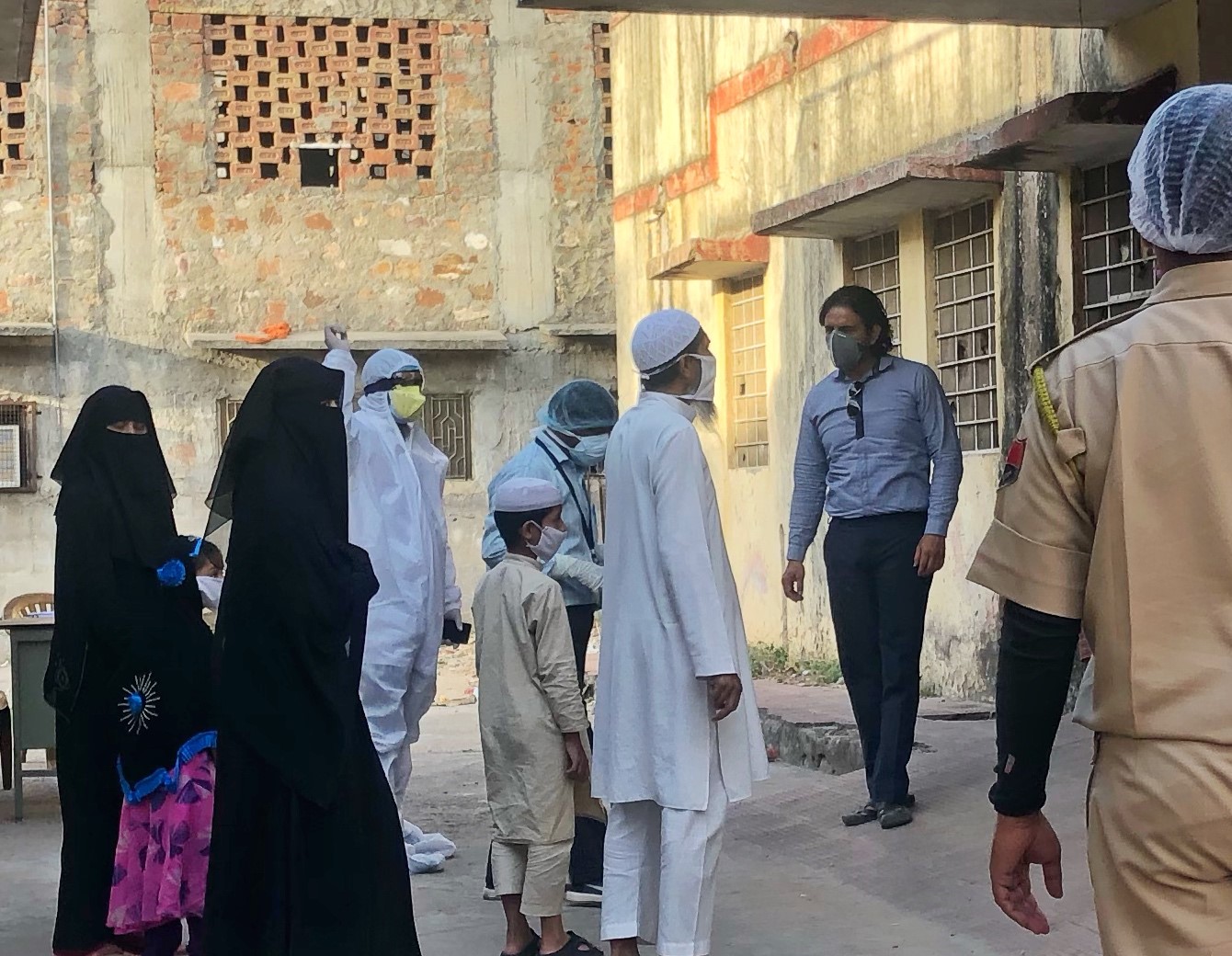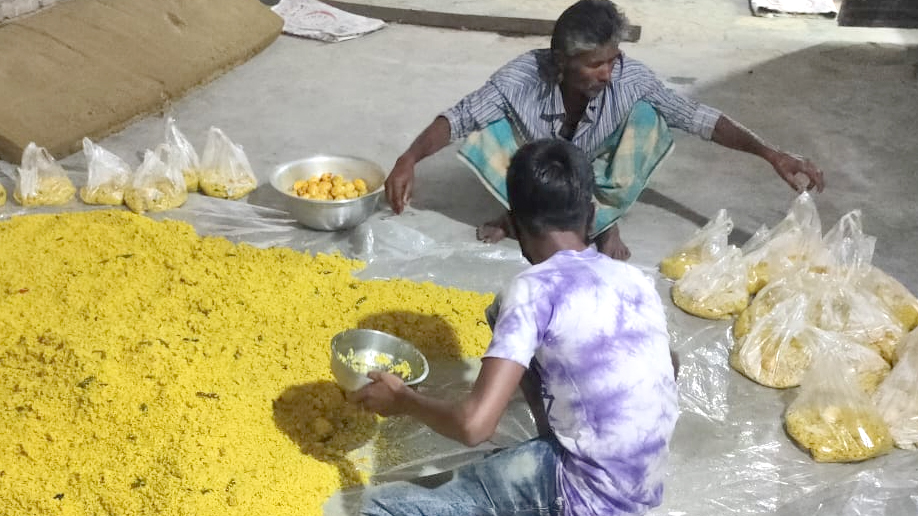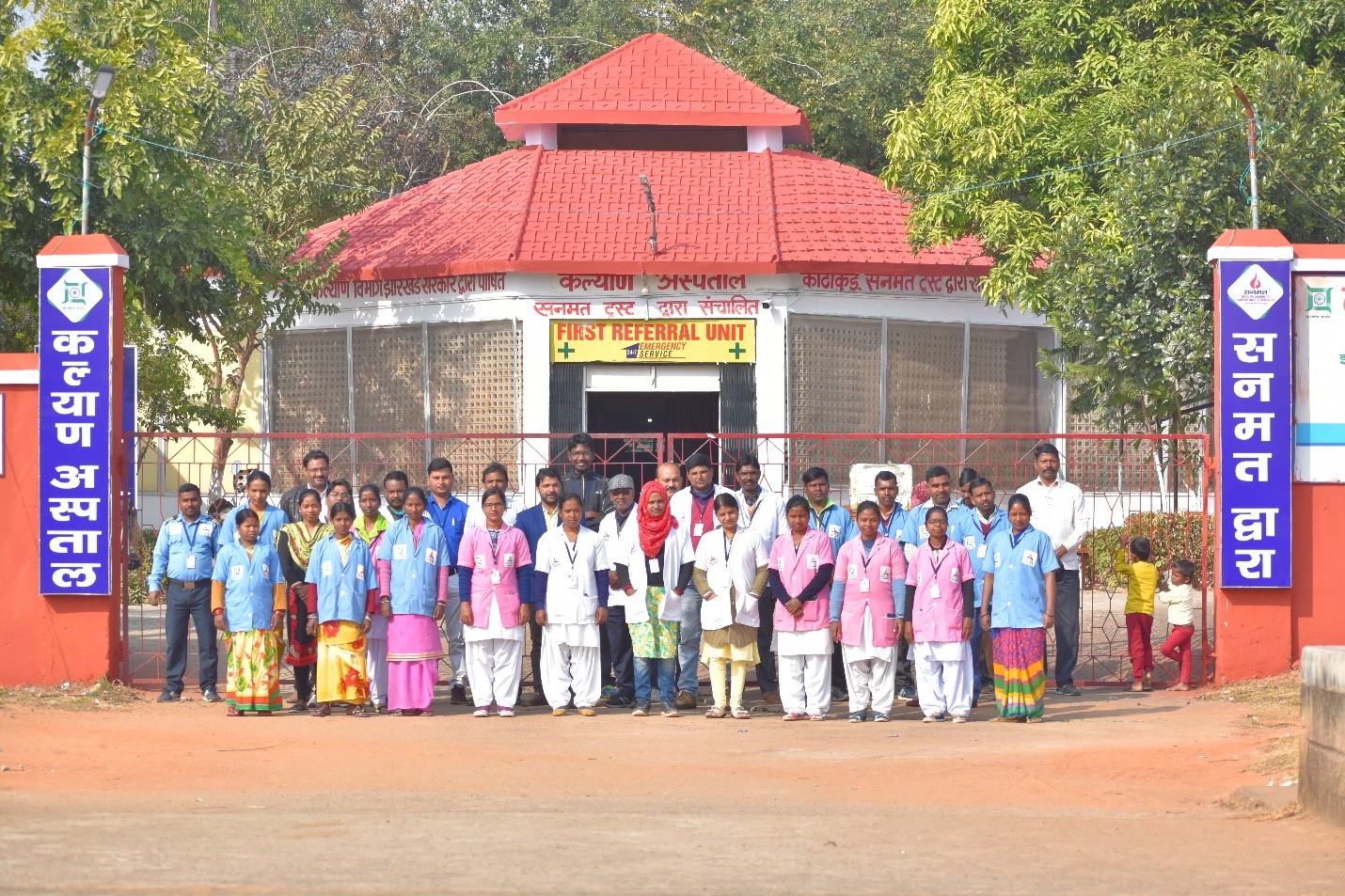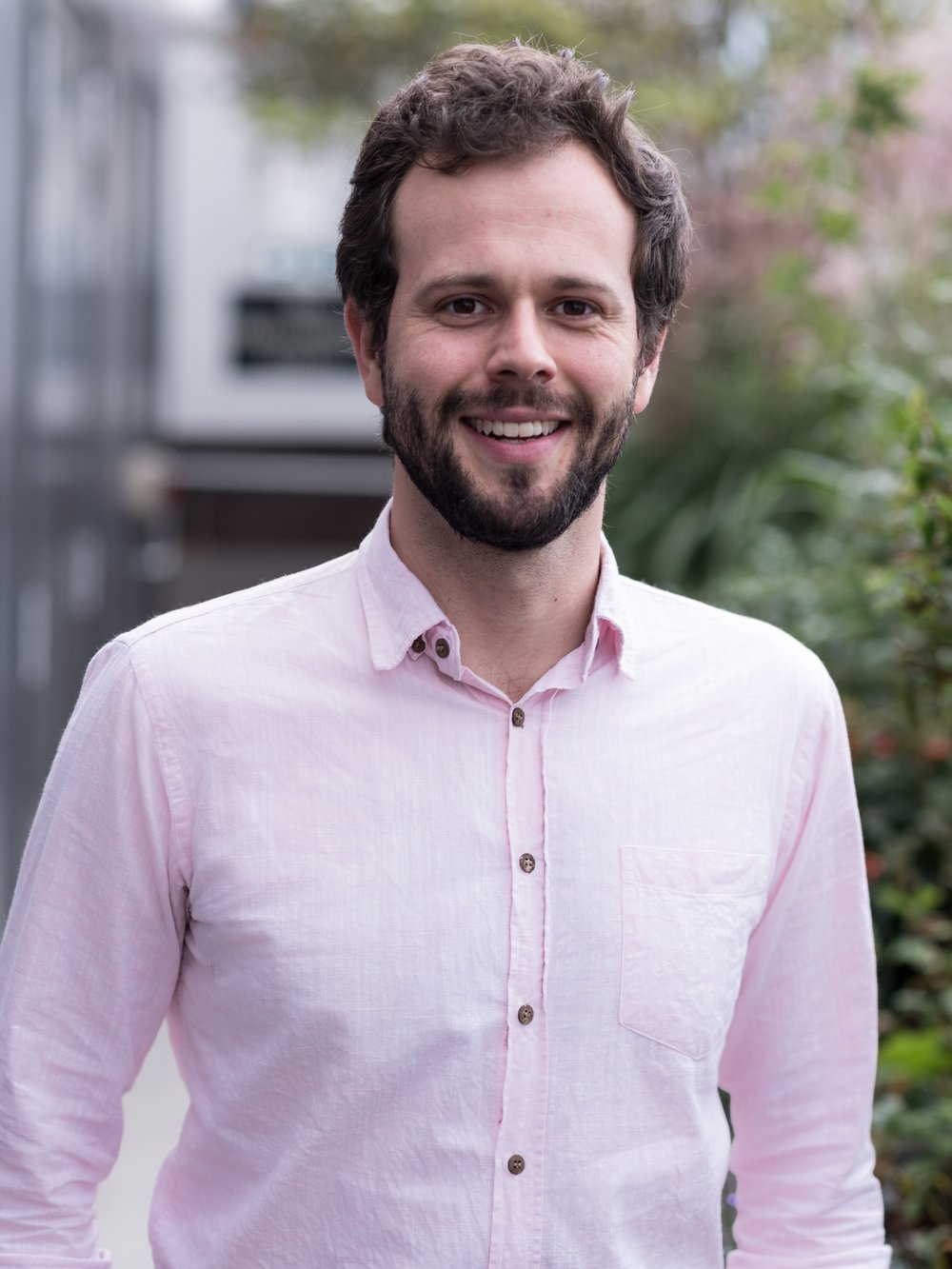The whole world has had to quickly adjust to new ways of working and socialising in the wake of the coronavirus pandemic. IDS alumni work and live in many different places across the world and we’ve asked a few of you to tell us a little more about changes you’ve had to make to your work and lives due to Covid-19 and how you’ve been contributing to the global response.
Aqueel Khan MA Governance, Public Policy & Development 2019
Aqueel tells us about his experience as a civil servant on the frontline at a main hotspot in Jaipur, India. [Photo is of Aqueel trying to convince urban poor community members to get tested for COVID-19 and creating awareness for social distancing].

"Being a civil servant, I’m used to of responding to emergency situations and disaster management. The current pandemic is a rare situation and it requires extraordinary commitment to counter and save human lives. I have been appointed as Area Magistrate at the main hotspot in Jaipur city of India, which has seen 570 positives so far. Other than active participation in strategising and preparing containment plan, since my appointment here, I’ve been working on the frontline to plan, execute and monitor 3 major tasks. Firstly, I provide direction and support to the medical teams for survey, screening and tests. I also take care of sending positives to hospital and their primary and secondary contacts to quarantine. Since curfew has been imposed and area has been sealed, providing food supplies and free dry food packets to the poor is the second major task. Thirdly, maintaining law and order through police to ensure that people follow social distancing.
This hotspot area has a population of almost four hundred thousand people in about three-square kilometres of area. The major change in my life is that I haven’t been home in 27 days despite being in the same city. I’ve been working from 8 in the morning till midnight without a day’s break. After reaching my isolation place at midnight washing clothes, taking shower and then dinner has become a routine. There’s some respite in the last 4 days because the number of positives is under control. Keeping fingers crossed to getting the area in particular and the world in general, back to normal. The best part is that despite this hectic schedule, I feel fortunate to have got an opportunity to help masses at large during these testing times."
Charlotte Bilo MA Poverty & Development 2016
Charlotte shares some of her experience of working at International Policy Centre for Inclusive Growth (IPC-IG) in Brasilia on social protection during the Covid-19 pandemic.

"Since I graduated from IDS, I've been working at the International Policy Centre for Inclusive Growth (IPC-IG) in Brasilia, a research centre based on partnership between UNDP and the Brazilian Government. Here at the IPC-IG we have always worked a lot in the area of social protection, together with Governments of the Global South and other international organisations. With the outbreak of the covid-19 pandemic, the need for social protection schemes has become ever more important and many countries across the world, such as Brazil, have started paying emergency cash transfers for those most in need. At the IPC-IG, together with our partners such as UNICEF, we have started mapping and analysing these policy responses and are elaborating several technical briefs with policy recommendations.
In addition, I have been involved in an inter-agency task force which is elaborating a weekly newsletter on the topic as well as a weekly webinar series with experts, discussing the most recent impacts of and responses to the Crisis (for more see
here). One of the webinars that I am currently organising will be on the impacts of the crisis on paid and unpaid care work."
Mamunur Rahman MA Gender & Development 2007

Ella Foundation founder Mamunur Rahman tells us how the Foundation along with the Society of Ella Association (SEA) and Ella Alliance (EA) have been working in Bangladesh to support its community during since the outbreak of COVID-19. [
About the two prongs of Ella Pad: SEA is a unique example of women's leadership, where underprivileged women set up their own enterprises, leading the Ella Pad initiative and making a profit from their own small enterprises. While at the large factories of Ella Alliance (EA), the Ella users form committees for the smooth operation of Ella production and distributions inside the factories. They are guiding the factory management in ensuring menstrual hygiene management of their fellow workers. With the support of factory welfare officers and factory doctors, Ella users' committees are controlling the whole process. Find out more about Ella Pad. [Photo is of Ella Foundation Volunteers preparing bags of food for distribution. Credited to Ella Foundation/ Ibrahim Hassan]
"As soon as the outbreak of Covid-19 began Ella Foundation supported its community to
make masks out of garment scraps, the same way they were making sanitary napkins. Ella Pad openly shared the guidelines for making the masks to make it to discourage the environmental pollution that was seen in the discarding of low-quality plastic masks that many were using, and
kept on doing advocacy to replace these plastic-based masks with locally made cloth ones.
EA members began making masks for their own community of more than 1 million people and approached the Prime Minister’s Office to support the EA in distributing the free masks countrywide. On March 19, 2020, the Ella Alliance members with the support of the Prime Minister Office launched the free mask distribution program and involved 64 administrative districts of Bangladesh with their works.
Large factories began to shut down around one week later and SEA members kept on making the low-cost masks from their homes. Over a million cloth masks have been distributed so far by both EA and SEA. Meanwhile, Bangladesh has drawn the global attention of gaining the capacity of making the general use masks.
In addition, Ella Foundation is providing free food as a part of its charity program. Currently, the organisation is providing free food for 100-120 people every day with a target of 4000 poor people in next three weeks to ensure their basic nutritional needs are met in the fight against the Covid-19.
About 14% Bangladeshi people are now not getting access to food, as recent study says."
Amit Choubey MA Governance & Development 2010
Sanmat (
Sri Someswar Nath Mahadev Trust) founder Amit Choubey tells us how the Trust has been using it’s connections and resources to fight Covid-19. [Photo is of Health Care Team of Dumka: COVID Care Hospital]

"Sanmat focuses on bridging governance gaps in the execution of various Government & Non-Governmental programs for the marginalized communities with the aim to reach the last person. We have 143 team members (which includes 24 medical doctors) working for rural and tribal communities of Bihar and Jharkhand with a focus on health & livelihoods. We are, a facilitator for MGNREGS (Mahatma Gandhi National rural guarantee Scheme) in parts of Bihar, a skill training implantation partner for Governments of Bihar & Jharkhand, an Implementation partner to National Green Highway Mission, Govt. of India, and we run two completely free 50 bed (each) hospitals for tribal communities in districts Jharkhand Dumka and Jamtara.
Find out more.
To help fight the coronavirus pandemic we organized a community sensitization campaign through our 3,000 skill trainees and 4,000 volunteers and field workers in Bihar and Jharkhand. To date we (entire team including all our centres and liaison offices) have adopted 630 families to support with food, grains and other essentials. When Covid-19 first started almost all government & private hospitals refused to take coronavirus patients. We took on this challenge and requested local administration help to convert our hospital into a COVID Care hospital. Now we are the first Covid Care Hospital in Entire Santhal Pargana region.
We have also started zoom classes for our trainees and are taking this time to upgrade people towards making them comfortable in using such virtual platforms."
Pedro Telles MA Development Studies 2013
Pedro has spent his time during the pandemic pushing for policy changes in Brazil, including working on a nationwide campaign that was successful in implementing a basic income policy.

"In Brazil, the situation is particularly difficult because are dealing with a president who insistently downplays the gravity of Covid-19. As development practitioners and activists, we need to cope both with the health crisis and a crisis in political leadership, complemented by a persistent lack of trust in institutions.
The upside is that many civil society organizations and movements are finding opportunities to set the agenda during the Covid-19 crisis and push for policy changes that would otherwise be hard or nearly impossible to achieve. I have helped build a
nationwide campaign that led Congress to implement a basic income policy in response to the crisis, and many colleagues are working on similar efforts in other areas such as public health services and housing. When public attention turns to the need for urgent action around inequalities and their consequences, politicians become more sensitive to calls for bold action - and this is where we are focusing."
Rohan S Katepallewar MA Globalisation Business & Development 2018
Tells us about the changes they are experiencing, both professionally and personally, especially after the announcement of the nationwide lockdown by the Indian government.
"The Covid-19 pandemic has changed many things in the world and like millions of people I am one of those who have seen massive transformations in personal & professional trajectories within short span of time.
I work with a social tech company - Gram Vaani Community Media (
Gram Vaani means voice of the village). We offer a participative voice-based platform, which can be accessed 24x7 using any phone/smartphone for free. People give missed call to access our platform, our servers call them back. Thereby end users can listen to various contents (combination of studio recorded content and information contributed by their peer). People can even record their own concerns/information. The platform provides contextual and relevant information to rural & urban poor who are excluded from the mainstream media channels. My job is to manage a few research programs and to build partnerships for business expansion.
Find out more.
During the nation-wide lockdown, phone became the only mean of communication and source of information for rural/poor communities and industrial labourers. Thus, for last few days, we have experienced a massive rise in the number of people accessing our platform (up from an average 40,000-50,000 per month to 65,000 in just two weeks after we launched a Covid-19 relief strategy on 24 March). People are recording their stories of despair and helplessness, and their struggles to secure necessities, such as food and cash.
In this context, given the rising relevance of phone-based media platform during the lockdown, many stakeholders (Government institutions/NGOs/private players) are keen to know more about it. They are interested in the services such as community surveys, need assessment and grievance redressal. Accordingly, I coordinated with many stakeholders to effectively address the concerns of our end users. As a part of my organization, I led the discussions for broader partnerships and to execute our relief strategy on ground. I built and submitted several proposals to secure funds and to expand our reach. Overall, the professional part of my life has kept me on my toes and various insights have compelled me to introspect deeply about the question- how can we build the post Covid-19 world differently and with lesser socioeconomic divide?
Personally, I have experienced several hiccups during these unpredictable times; and am sharing four trajectories:
- Lockdown has been a sort of blessing in disguise as I was able to travel to Trivandrum to live happily together with my wife. Usually we have a long-distance relationship as my work location is Delhi NCR and as my wife works with the Kerala Government (currently managing supply chains in the state).
- I am constantly worried about the health of my mother and grandmother in Pune, especially as the region has become Covid-19 hotspot and securing even basic health services has become difficult. It is the perennial feeling of helplessness due to travel ban, which troubles me a lot. I feel relieved only after I talk at least thrice a day with my mother. At times, it becomes difficult to coming to terms with this uncertainty when there is no assurance of getting this lockdown over. It then boils down to my ‘psychological defence mechanisms’ to cope up with the situation.
- I am experiencing a new trend among my friends/colleagues/relatives, whom I relate to over the social media. Each member seems to be quite busy with multiple group activities, games and they have constantly been discussing about binge watching platforms. I realized that a typical middle-class youth have been relying on these ‘internet-based’ tool to sustain themselves during the crisis, which has put everyone under physical confinements. I fear that if they remain trapped in these bubbles and remain aloof from the real problems such as socio-economic inequality, we may lose the chance to act against it, forever.
- My professional life is compelling me to constantly confront the issues associated with Covid-19 and the precarious condition of poor. It restricts me from getting trapped in the bubble, which seems to be limiting the vision of people belonging to my ‘social class’."
Thank you to all the alumni who contributed to this article (see more in Alumni Responses).
We hope all our alumni stay safe and well during these unusual times.
If you would like to share your experiences with the community please contact the alumni office.
